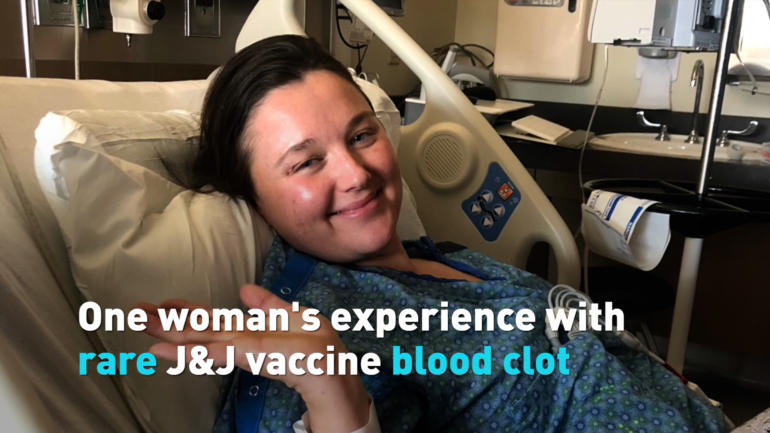The U.S. Centers for Disease Control and Prevention now says a total of 28 people are known to have developed blood clots after receiving Johnson & Johnson’s COVID-19 vaccine. Three of those people died. The extremely rare blockages caused the vaccine to be put on hold for a time last month, but shots have since resumed.
One patient in the U.S. state of Colorado survived with the help of a new type of blood clot treatment. Hear Morgan Wolfe’s story.
40-year-old Morgan Wolfe of Denver received the Johnson & Johnson vaccine on April 1st. Six days later, “Suddenly I felt chills and headaches and body aches all at once,” she said.
Her headaches progressed and on April 13th she decided to go to the hospital.
“As we were leaving, I saw the news about the pause in the J&J, and the timeline fit and the symptoms fit,” Wolfe said.
That same day, federal authorities asked states to stop administering the J&J vaccine while they investigated the cases of six women who’d developed severe blood clots in the brain after getting the shot. X-ray images taken at UCHealth also turned up clots in Wolfe’s brain and lungs.
“I would never call her lucky overall but if you’re gonna have this happen, I can’t imagine a better setup,” said Dr. Todd Clark with the University of Colorado School of Medicine.
He said the U.S. Centers for Disease Control and Prevention had warned doctors not to use the drug heparin to treat the blood clots as they normally would, without specifying an alternative.
“Heparin’s a blood thinner, but in some people it can actually trigger a paradoxical response where it makes more clots,” Clark said.
So the hospital improvised with a different drug. Six days after being admitted, Wolfe was able to go home.
“You know it’s a little bit surreal to be a part of it but I’m happy to share my story and to be part of research,” Wolfe said.
News of the blood clots had a definite impact. A recent poll showed fewer than one in four Americans not yet immunized against the coronavirus would be willing to get the J&J vaccine.
Contributing to vaccine hesitancy that’s limited the number of shots into arms thus far. A total of 28 blood clot events with three deaths have now been reported. And yet with nine million J&J shots administered, Clark believes the public should take away a different message.
“This very easily could be a case that inspires confidence in the vaccine,” he said. “We found it quick, we got the word out quickly, we found a treatment that is successful and can be done safely and that’s a win, that’s a huge success.”
Wolfe said her journey, as she calls it, has been challenging.
“People just hear blood clots and that’s scary but I hope that my treatment shows that now they know how to deal with it,” she said.
And perhaps restore some confidence in vaccines in general, which she still believes are a valuable tool in knocking down this disease.
 CGTN America
CGTN America

